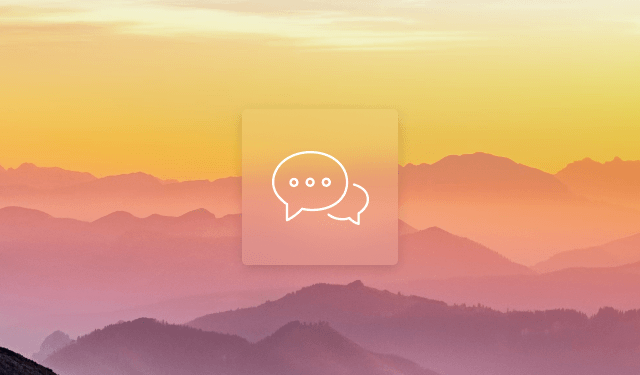What unites industry giants like Walmart, CVS Health, Bank of America, and Johnson & Johnson from the list of the 100 largest companies by revenue in 2026? It’s their strategic deployment of enterprise chatbots, specifically, their embrace of Agentic AI. This next generation of artificial intelligence is transforming how companies interact with clients, with 24% of firms already adopting these advanced tools. The forward-thinking companies have recognized the benefits of chatbots for business to deliver a more human-like, conversational experience. Agentic assistants can understand complex requests, proactively offer solutions, and even anticipate user needs, going far beyond the capabilities of basic bots.
What’s driving this widespread adoption? The answer lies in the automation, cost-effectiveness, and smooth flow that AI brings to the table. Enterprise chatbots simplify time-consuming tasks across various domains, like client support, sales, and marketing, while optimizing internal processes. Moreover, they eliminate the need for additional staff or resources.
Notably, these conversational remedies reduce client costs by up to 30% and resolve 80% of FAQs. Organizations adopting bots have witnessed other significant benefits, including improved service capabilities (69%), streamlined internal workflows (54%), raised consumer satisfaction (48%), and boosted use of data and analytics (41%).
In essence, industry leaders are implementing enterprise chatbots to stay ahead of the competition. The question is: Is your organization ready to follow their lead? Have you adopted digital assistants to redefine impressions and drive operational excellence? Let’s explore their value for your clients and employees in this article.

Table of Contents
What is an Enterprise Chatbot?
These assistants go beyond the capabilities of basic bots. Solutions for big companies are usually advanced automated systems engineered to replicate human conversations. These tools are powered by machine learning (ML) and natural language processing (NLP). They comprehend everyone’s intent and handle multifaceted tasks. In fact, Gartner predicts that by 2027, bots will become the primary customer service channel for roughly 25% of organizations.
In a corporate context, a chatbot for enterprises improves efficiency, serving employees and consumers alike. It swiftly provides information, automates repetitive tasks, and guides managers through different processes. As a result, bots significantly reduce agent workload while fostering collaborative teamwork. Moreover, they play a critical role in people support. These digital assistants handle inquiries, offer instructions, and initiate ticketing processes.
The power of enterprise chatbot features for business communication lies in their essential capabilities that enable them to:
- Automate complex tasks, reducing manual workload for optimal company processes;
- Maintain context throughout conversations, ensuring seamless interactions and personalized responses;
- Perform across diverse communication channels for consistent and effective client engagement experiences;
- Collect extensive client data, refining communication strategies for better enterprise AI chatbot performance;
- Implement robust authentication measures, safeguarding sensitive data and delivering secure interactions;
- Facilitate smooth transitions between automated responses and human agents;
- Anticipate needs, proactively addressing potential issues and guiding people to appropriate solutions;
- Improve accessibility and encounters with voice features.
How do They Work?
Bots are designed for a specific purpose: to answer questions, respond to comments, and handle queries within chat interfaces or through voice interactions. They employ artificial intelligence (AI), automated algorithms, natural language processing (NLP), and machine learning (ML) techniques.
Automated algorithms involve providing the chatbot with business documents and guiding it through self-training. Using these documents, the engine generates a list of questions and responses. Accordingly, the bot gains the ability to respond with confidence.
Natural language processing is a blend of linguistics, computer science, and artificial intelligence. NLP assists in translating human language into patterns and text that can be interpreted in real-time to generate suitable responses.
Machine learning, it’s a form of artificial intelligence (AI) and computer science. It centers on employing data and algorithms to mimic the human learning process, gradually improving its precision.
Benefits of a Chatbot for Enterprises
For Your Business
- Cost and Time Savings: Automated chatbots reduce the need for hiring additional staff, reduce customer wait times and resolve issues quickly, leading to efficient problem resolution.
- Quick Information Retrieval: Bots swiftly provide product details, pricing, and other information, improving customer decision-making.
- Increased Sales: By guiding a person through the buying process, bots boost conversion rates and drive sales.
- Efficient Lead Generation: By collecting and analyzing personal data, lead generation bots identify potential leads, qualify them, and guide them through the sales funnel, thereby enhancing the effectiveness of lead generation efforts.
- 24/7 Availability: Virtual assistants offer round-the-clock assistance, ensuring customers interact with your business at any time.
- Scalability: Chatbots handle multiple conversations simultaneously, enabling seamless customer interactions during peak periods.
For Your Customers
Boosting User Engagement and Fostering Brand Loyalty
Conversational enterprise chatbots are key to driving client interactions and building lasting allegiance. They excel in customizing user experiences by understanding individual preferences and delivering tailored remedies, fostering strong brand relationships. Always-available, bots provide instant responses, regardless of time zone, demonstrating reliability and dedication to satisfaction. Furthermore, they offer consistent support across all platforms, improving brand coherence and professionalism. Finally, with multilingual capabilities, virtual assistants break down language barriers, showcasing a global outlook and inclusivity.
Reducing Costs and Increasing Revenue
Digital tools allow businesses to allocate resources more efficiently. For example, enterprise chatbots significantly reduce operating and customer service costs by automating repetitive tasks. Simultaneously, they can identify potential leads, guide purchasing decisions, and drive revenue growth.
Gaining User Insights and Enhancing Customer Care
Enterprise chatbots supply valuable data and facilitate continuous self-improvement. They collect data needed to analyze client preferences and behaviors. Such insights help to modify care strategies for a boost in service quality. The bots’ ability to learn and adapt guarantees that they evolve to meet changing consumer needs, delivering sustained enjoyment.
For Your Employees
Raising Employee Engagement
It’s already well-known that bots facilitate seamless communication within organizations. They foster active communication and engagement among employees. By providing instant access to essential information, updates, and resources, the chatbot for enterprises empowers employees to stay informed and engaged with the company’s mission and objectives. This fosters teamwork, unity, and dedication, nurturing a dynamic and motivated workplace culture.
Elevating Worker Satisfaction & Productivity
Enterprise chatbot solutions play an essential role in cultivating employee fulfillment and raising workplace effectiveness. By automating repetitive tasks, these intelligent systems save valuable time. Thus, bots enable workers to focus on creative, critical, and strategic tasks. Specialists can achieve their goals more efficiently, leading to a sense of accomplishment and job contentment. Improved experience contributes to a positive atmosphere with a motivated and productive workforce.
Stress Reduction and Enhanced Retention
The demanding nature of modern workplaces can lead to burnout among employees. Advanced chatbots reduce this pressure by handling mundane tasks. Such support not only promotes a healthier work-life balance but also prevents exhaustion. Moreover, by prioritizing well-being and job satisfaction, AI-powered bots contribute significantly to talent retention.
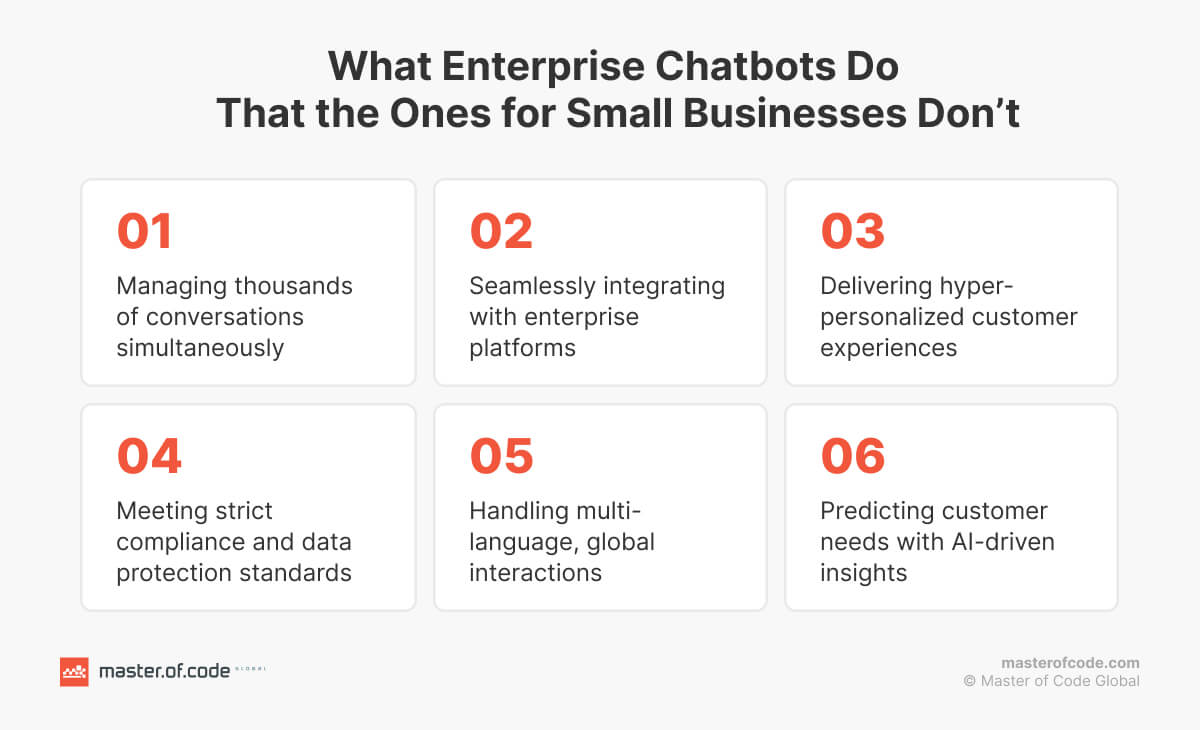
Types of Enterprise Chatbots
Not all bots are created equal, especially when it comes to meeting the diverse needs of businesses. In the realm of numerous chatbot types, selecting the right one for big firm applications is paramount.
Enterprise-grade solutions come in three main types, each with unique capabilities:
- Rule-based chatbots. This chatbot follows predetermined rules and responses created by human programmers. These rules guide the chatbot’s interactions. When a user sends a message, it looks for a matching rule in its database and responds accordingly. Rule-based chatbots are effective for specific tasks with set patterns but may struggle with intricate or unpredictable conversations due to their limited programmed responses.
- Conversational AI chatbots. These intelligent tools excel in deciphering intent and engaging clients in dynamic, personalized conversations. The main difference is that AI chatbots can learn and adapt from interactions, improving their response quality over time. They excel in natural language processing, comprehending and interpreting user input, regardless of its phrasing. They grasp context, identify intent, and provide relevant responses. AI bots often incorporate sentiment analysis, enabling them to comprehend user emotions and tailor interactions accordingly. These integrated chatbot features make conversations with chatbots more captivating, personalized, and efficient. This ability, a hallmark of Conversational AI for enterprise benefits, results in heightened satisfaction. Thus, companies can enjoy strengthened relationships with consumers and increased brand loyalty.
- Generative AI-powered chatbots. Integrating digital capabilities elevates enterprise chatbot interactions by generating contextually rich, human-like responses. These assistants give consistent brand messaging and compelling content across platforms, leading to better engagement and reinforced brand identity. For companies, this translates into brand allegiance and higher conversion rates. At Master of Code, we specialize in aiding businesses to harness Generative AI for crafting immersive experiences for their clients. We integrate a middleware data exchange system into the NLU or NLG system, incorporating Generative AI in customer service into the existing Conversational AI platform. Our framework is constructed upon the pre-existing chatbot, eliminating the necessity to create a Generative AI chatbot from scratch.
- AI agents. These highly sophisticated systems go beyond simple conversations to perform tasks, make decisions, and even learn independently. They can analyze vast amounts of data, identify patterns, and adapt their behavior accordingly. This makes agentic solutions ideal for complex tasks like consumer help, sales, and marketing.
Depending on the mode of communication, organizations can further customize their software:
- Voice-enabled chatbots. Offering natural and engaging interactions, these tools reduce response times. In time-sensitive industries, such as finance and tech, swift, accurate responses are essential. Voice-enabled enterprise chatbots streamline client service operations, leading to improved retention rates.
- Text-based assistants. Quick and precise, textual bots excel in comprehending complex inquiries. They optimize consumer interactions, upholding efficient query handling and valuable feedback collection. Organizations benefit from their rapid response times to provide proactive support and gather valuable data for continuous improvement.
- Multimodal tools. Engaging people through various channels, including text, voice, and video, flexible bots offer a seamless and inclusive experience. These intelligent tools strengthen interactions, delivering versatile communication options. Companies adopt multimodal enterprise AI chatbots to boost client engagement and reach a wider audience.
Chatbot for Enterprises: General Use Cases
Customer Service
Conversational AI chatbots excel in addressing various tasks promptly and efficiently. From updating account information and resolving common FAQs to troubleshooting problems and presenting access to essential documents, these intelligent assistants streamline a wide range of client service tasks. Round-the-clock availability of the enterprise chatbots eliminates wait times, making bots an invaluable asset for businesses. To sum up, they streamline a wide range of functions, including:
- FAQ: Provide instant answers to commonly asked questions, improving response times and client enjoyment.
- Knowledge base: Guide people to relevant articles and resources, empowering them to find needed approaches independently.
- Escalate to a specialist: Seamlessly transfer complex issues to human agents, giving a smooth transition and efficient resolution.
Example: Empowering over 30 million subscribers, Customer Self-Service Chatbot for Satellite Radio Provider developed by Master of Code Global offers swift solutions for subscription management, billing inquiries, and account updates. Users can easily renew subscriptions, troubleshoot signal problems, access billing history, and explore re-subscription offers. This enterprise chatbot refines customer experience, reducing reliance on live agent help.
Performance results:
- 120K average weekly users;
- 80% containment rate of streaming flows;
- +46% improvement in subscription rate;
- 1,000% payments processed a month.
Internal Virtual Assistants
An internal chatbot is a specialized software designed to give a hand to employees within an organization. It serves as a virtual assistant, delivering instant responses to queries, offering guidance on company policies, and aiding in various tasks. The bots integrate seamlessly into existing communication platforms. Incorporation of an enterprise chatbot for business automation leads to better employee support and organizational efficiency. By automating routine tasks, it saves time, boosts productivity, and optimizes internal communication. This way you can create a more efficient workplace environment. That’s the reason why so many companies adopt internal software to optimize operations and foster seamless collaboration among employees.
Internal chatbots for business can be used for:
- IT helpdesk: Deploy advanced chatbots to assist employees with technical issues, giving 24/7 aid for IT-related inquiries. Automate routine duties, saving time and resources while giving immediate IT support.
- HR tasks: Streamline processes such as updating personal information, accessing benefits, and handling common inquiries. Upgrade employee encounters by offering instant HR assistance and freeing up teams for strategic initiatives.
- Employee onboarding: Facilitate integration journey by providing new hires with essential information, access to documents, and company policies. Accelerate initiation into the organization, safeguarding a smooth transition for specialists.
- Day-to-day tasks: Mechanize routine activities like scheduling meetings, managing calendars, tracking expenses, and handling time-off requests. Offer employees round-the-clock backing for everyday tasks, improving operational efficiency and productivity.
Example: McDonald’s Recruiting Bot simplifies the application process through a convenient “text to apply” functionality. It engages with candidates, answering queries, screening for prerequisites, and scheduling interviews. Their enterprise chatbot is integrated across various channels, including the career website and digital menu boards. It enables candidates to initiate applications through text conversations. Such an approach aligns with McDonald’s commitment to consistency and speed.
Performance results:
- 89% engagement rate;
- 83% interview completion;
- 95% positive candidate impressions;
- 90% adoption rate;
- 60%+ reduction in time to hire.
Sales and Lead Generation
Enterprise chatbot solutions help optimize pipeline management processes with unmatched capabilities. They influence the sales funnel and drive revenue growth by:
- Curated suggestions: Offer unique products or recommendations based on preferences and browsing history, increasing upselling and cross-selling opportunities.
- Capture & qualify leads: Automate various tasks, including:
- Validation: Analyze soon-to-be MQLs by verifying contact information and gathering relevant data.
- Prospecting: Identify potential clients and initiate conversations.
- Managing: Track leads throughout the sales pipeline.
- Categorization: Segment them based on specific criteria for targeted marketing efforts.
- Personalized engagement: Deliver tailored marketing processes with chatbot for enterprises by:
- Outreach: Engage prospects with tailored messages and offers.
- Customer segmentation: Group clients based on shared characteristics for targeted projects.
- Tailored marketing campaigns: Create and deliver unique experiences that resonate with individual needs and preferences.
Example: Luxury Escapes, a leading premium travel provider, improved the experiences they offer by implementing a Travel Messenger Chatbot customly developed by Master of Code Global. This bot optimized the booking process, enabling people to search and choose trips according to their preferences. By offering unique deals and interactive features, the tool significantly boosted engagement. It allowed the brand to drive higher sales and generate quality leads.
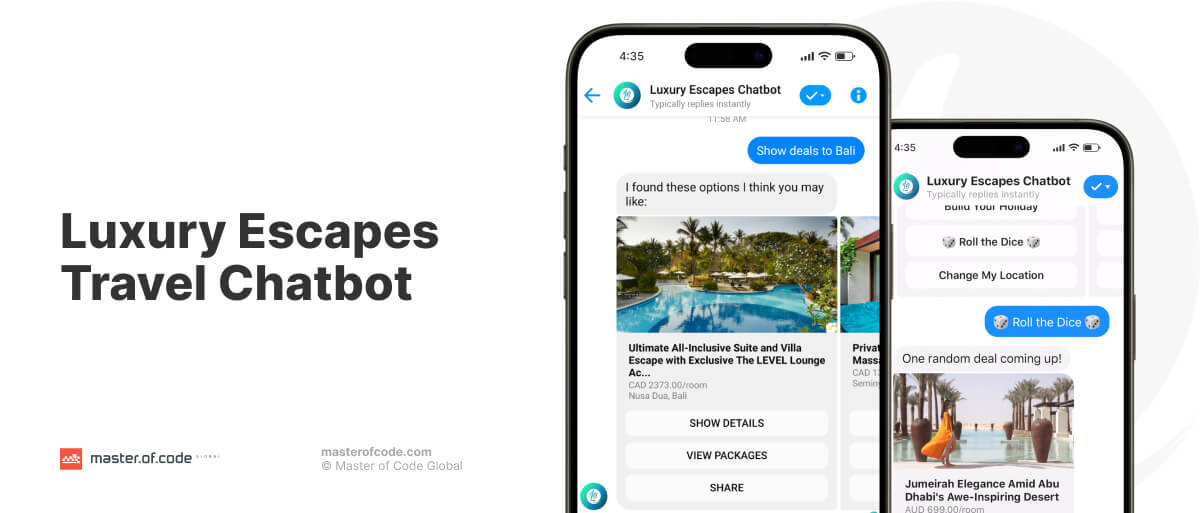
Performance results:
- 4070+ deals viewed and 6200+ users engaged with the bot in 3 months since launch;
- $300,000 in revenue within its first 90 days;
- A reply rate of 89% for retargeting messages and a conversion rate of 52.63%;
- A conversation rate of 12%, which is 3 times higher than the website’s one.
Sector-Specific Digital Solutions
While enterprise chatbots offer numerous benefits across various sectors, their applications can be further tailored to meet the unique needs of certain industries. Here are a few examples:
- 1. Supply Chain
- Goods tracking: Digital agents can guarantee real-time updates on the location and status of packages, improving transparency and efficiency.
- 2. Insurance
- Claims resolution: Automate various aspects of the insurance claims process, such as:
- Gathering critical information from claimants.
- Reporting to the carrier.
- Providing updates on assertion status.
- Claims resolution: Automate various aspects of the insurance claims process, such as:
- 3. Healthcare
- Health assistance: Elevate patient engagement by offering personalized recommendations and support to your medical clients.
- Symptom collection: Employ patient symptom tracking to collect and analyze reported conditions, effectively monitoring health states and giving timely interventions.
- Unlocking data: Extract key information from conversations to improve diagnosis and treatment.
- 4. Automotive
- Debt resolution: Assist with handling bill-related issues, including debt collection and managing loan payments.
- Effortless buying journey: Guide customers through the car purchasing experience, offering information on different models, financing options, and more.
- 5. Finance
- Client help: Provide instant answers to frequently asked questions about account balances, transactions, and other financial matters.
- Fraud prevention: Identify and prevent dangerous activities by analyzing behavior and transaction patterns.
- Monetary planning: Offer tailored financial guidance and recommendations based on individual needs and goals.
How are Enterprises Using Chatbots?
In today’s business landscape, bots are increasingly essential for enterprises, allowing them to enhance their customer support capabilities and streamline lead generation through automation. Here are some solid examples of how companies in diverse industries can utilize chatbots for business.
eCommerce Stores and Sales Chatbots
One of the reasons why customers abandon their shopping carts is because the checkout process is too complicated. When you have a chatbot guiding the customer, this will help simplify the purchasing journey because you’re not leaving the customers on their own. The chatbot for eCommerce will also be able to instantly answer questions a customer might have about your product which will encourage the customer to hit that purchase button ASAP.
Food Businesses and Ordering Chatbot
You don’t have to be a Pizza Hut or Starbucks to have a chatbot. Even if you have a home-based cupcake business or a small sandwich shop, you can streamline orders and deliveries by using a chatbot. A chatbot allows your business to entertain multiple customers and it also frees up your phone line so you can concentrate on fulfilling orders. More customers served means more revenue.
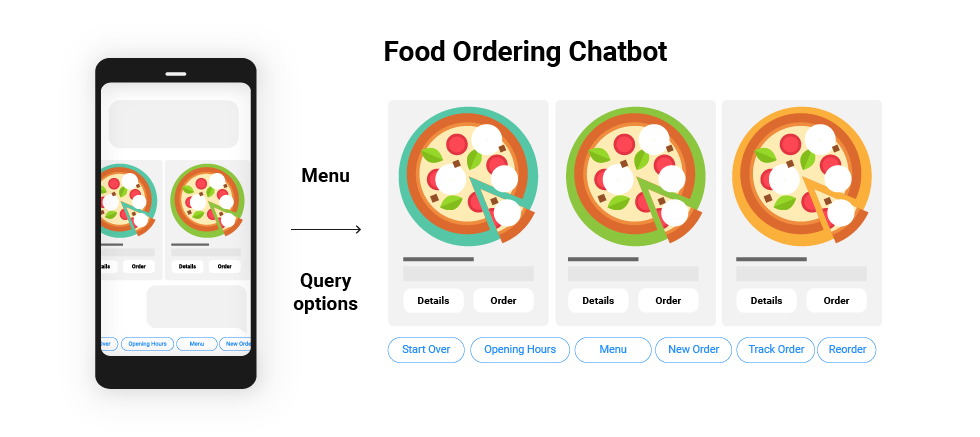
Event Companies and Booking Chatbots
There are different ways event companies can take advantage of chatbots such as ticketing, confirming event attendees, reminding guests of schedules, and also conducting post-event surveys. An organizer for a business conference can use chatbots as a method of delivering relevant information about the event. Chatbots are also useful for huge events like trade shows and concerts to manage hundreds or even thousands of participants more efficiently.
Research Organizations
The typical way to conduct a survey is to ask respondents to fill out digital forms where you leave them to answer on their own. Switching to a chatbot, however, makes the experience more interactive and you lessen the chance the respondent not completing the survey. This is because a chatbot provides a conversational feel that is more engaging.
Learning Institutions and Chatbot for Education
With online learning becoming more popular, schools, universities, and other educational institutions need to be able to address the needs of students while still keeping them engaged in learning. Education chatbots can help make online learning more interactive. It can be used to conduct quizzes, learning exercises, and deliver other instructional modules. Instead of students only learning from videos or answering online test questionnaires, a chatbot conducting a quiz makes the learning experience much more interesting and engaging.
Healthcare Companies
Healthcare chatbots can be used to conduct online consultations, address minor health-related questions, provide information about drugs and medications, and track their own health symptoms. Clinics can also use chatbots in scheduling appointments, giving outpatient reminders, and alerting patients about prescription refills. Check out the full potential and possible impact of
Generative AI Use Cases within Healthcare industry.
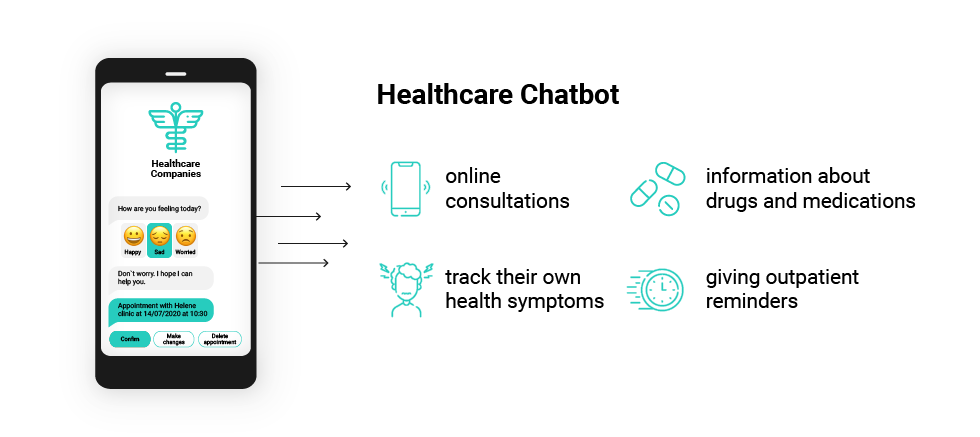
Banks and Financial Institutions
Banking transactions follow a stringent process that a human agent can find repetitive. For example, when customers want to check their account balance, calling an agent to do this means the agent has to perform several qualifying questions to confirm the identity of the customer. While this can be done through telephone voice prompts, many customers usually find these pre-recorded prompts tedious and time-consuming.
With a call center automation via chatbot, however, you can get immediate information by sending instant messages. That’s why more teams turn to finance chatbot development services to build secure, compliant assistants that reduce handle time and improve first-contact resolution.
The Wells Fargo chatbot is a great example of how this is done. Just by asking a question through an instant message, the Wells Fargo Banking chatbot can tell you how much is left in your account and even give you a summary of your expenses for a certain expense category.
Recruitment Teams
Sorting through job applications can be tedious and very time-consuming. If you are a big company, a job post will surely get thousands of applications but at the same time, it is not unusual for small companies to get hundreds of applicants as well.
Instead of using a human resource to review all the CVs one by one, recruitment companies and HR departments can use chatbots to prequalify applicants. The chatbot can help companies in screening applicants, scheduling interviews, onboarding new employees, training, and delivering information on company policies.
How to Build an Enterprise Chatbot Strategy?
Before diving into development, consider a crucial first step: virtual assistant consulting. According to Deloitte’s survey, 81% of contact center executives are investing in AI for agent-enabling technologies to improve the journey and operational efficiency. While the prospect of developing an enterprise chatbot may seem daunting, the right guidance can make the process seamless and rewarding.
A comprehensive audit, conducted by Master of Code Global, can unlock invaluable insights into your current bot performance and identify opportunities for optimization. For example, we recently helped GO Malta perfect their bot’s productivity and consumer experience through an in-depth audit and technical consultation. This involved evaluating every aspect of their enterprise AI chatbot, from its understanding and response capabilities to its integration potential. We equipped the company with a clear roadmap to improve conversational quality, resilience, and brand alignment, ultimately leading to a more efficient, scalable, and user-friendly solution.
Another success story is about empowering a finance company to successfully enter the Conversational AI space by conducting customized workshops to train their business units on designing, building, and launching such solutions. This way, we equipped the stakeholders with the necessary skills to launch two tools, covering crucial aspects like data analysis, journey mapping, and NLP matrix development.
These examples demonstrate the value of expert guidance in maximizing your enterprise chatbot investment. A comprehensive audit can help you:
- Improve key metrics: Boost satisfaction (CSAT), Net Promoter Score (NPS), and containment rates by identifying areas for advancement in your design and functionality.
- Expand use cases: Discover new and innovative ways to apply Conversational AI across your organization, from client service and sales to HR and internal communications.
- Maximize ROI: Make sure your investment delivers maximum value by aligning its capabilities with your specific needs and objectives.
By starting with a consultation and audit, you can lay a strong foundation for success and be certain your strategy delivers exceptional results.
What Factors to Consider When Choosing Chatbot Development Services?
Chatbots are gaining significant popularity among business owners. However, before you make the decision to implement a virtual assistant, it’s essential to ask yourself a few questions:
- What criteria should I consider when evaluating a chatbot?
- What factors do I need to take into account?
Select the Solution that Solves the Specific Problem
When deciding on a chatbot, focus on selecting a solution for a specific business challenge. Opt for a customized chatbot for business to address your precise issue. This ensures technology aligns with your business goals.
BloomsyBox wanted to create a Mother’s Day campaign focused on building stronger relationships with clients by providing a personalized experience. In collaboration with Infobip, Master of Code Global designed the first Generative AI chatbot that makes personalized greeting cards. The outcome was as follows:
- 60% of users who interacted with the bot successfully finished the quiz.
- 38% of users chose Generative AI to generate their greeting cards.
Select a Comfortable Chatbot Development Provider
When considering a chatbot for business, think about essential evaluation points: pricing, functionality, and user experience. Also, evaluate integration capabilities and support level of different chatbot solutions. Ensure the bot development provider aligns with your business needs and values. This leads to a successful and reliable partnership.
Select the Type of Chatbot According to your Needs
To choose a suitable chatbot, identify your goals and requirements. There are different categories to consider, including rule-based bots, AI chatbots, and generative AI chatbots. Each type has distinct purposes and varying capabilities.
During the COVID-19 pandemic, the Telecom brand recognized the need for an automated service solution for its clients. Master of Code’s bot tuners employed robust Natural Language Understanding training using actual customer phrases. As a result, over 1.1 millio
Enterprise AI Chatbot Solutions with Master of Code Global
Partnering with Master of Code Global for your bot needs opens the door to a world of possibilities. With our two decades of expertise and a proven track record of successful projects, we deliver customized enterprise AI chatbot solutions designed according to the chosen use case. Our team excels in crafting tools that seamlessly integrate with your brand communication channels, upholding authentic and engaging conversations.
From strategic planning to implementation and continuous optimization, we offer end-to-end assistance to boost your enterprise chatbot’s performance. With our masters by your side, you can witness the power of intelligent customized bots and see the outcomes, including but not limited to empowering your call center assistants. Moreover, our expertise in GenAI integration enables more natural and engaging conversations. This will allow you to foster deeper connections with your audience. Partner with us and enrich your organization with advanced bot approaches.






